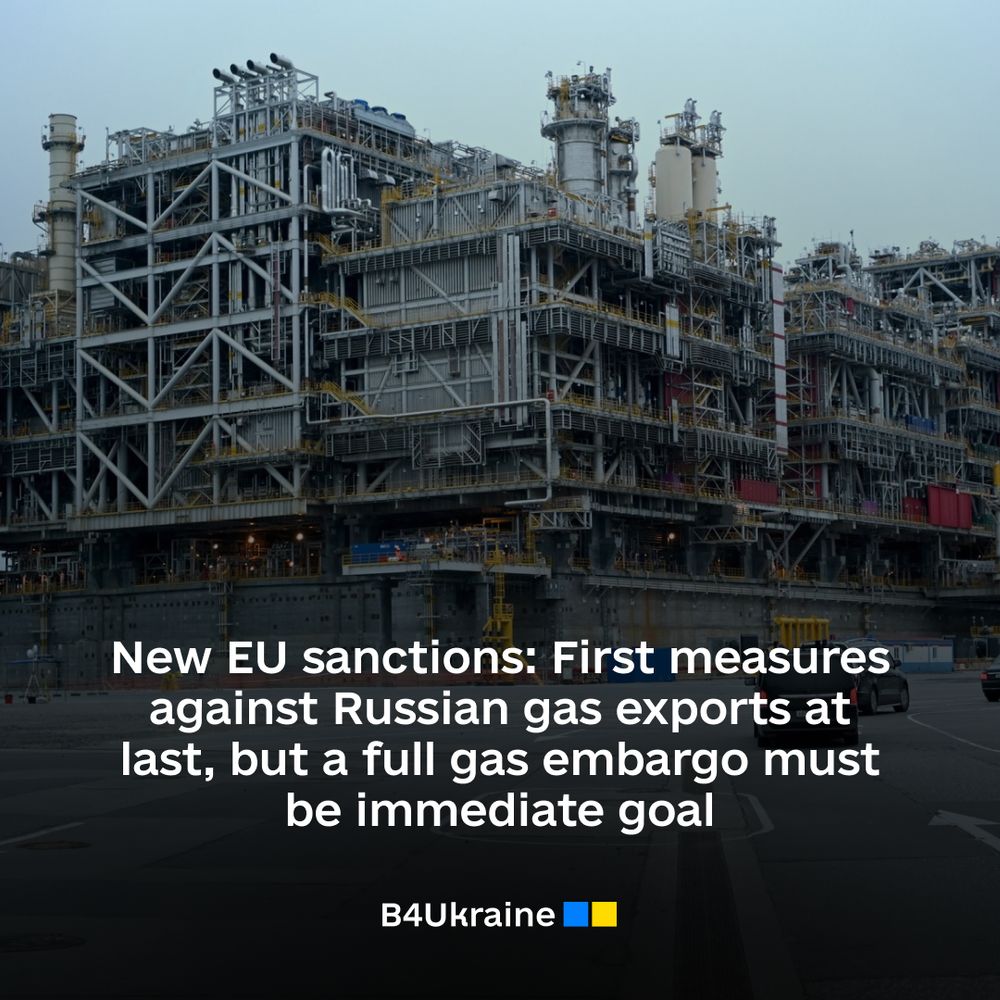
The global B4Ukraine coalition welcomes the fact that Russian gas exports are also being targeted for the first time since full scale invasion in the 14th EU sanctions package, adopted today. However, only the financing of new LNG infrastructure and the re-export of Russian liquefied gas (transshipment ban) have been banned. The latter is intended to prevent the EU from continuing to be a willing stooge for Russia’s gas exports to Asia. However, the EU must not stop halfway now, as the aforementioned measures barely curtail current revenues. In May 2024 Russia overtook US as gas supplier to Europe. B4Ukraine is calling on the German government in particular to advocate a complete LNG embargo. After all, while the import of coal and crude oil (by sea) was already banned in 2022, business with Russian LNG is booming more than ever.
Petras Katinas, energy analyst at the Finnish research institute CREA (Centre for Research on Energy and Clean Air), explains: “According to our calculations, the European Union has paid more than 85 billion euros for Russian gas since February 22, 2022. The Kremlin is using this money to finance its war against Ukraine. Russia is extremely dependent on access to EU waters and ports, especially for LNG exports from the Russian Arctic. Although the transshipment ban makes Russia’s gas exports more difficult, only a complete ban on imports would really put the Russian gas business from the Arctic under pressure. Without the nearby EU ports, gas transportation on special icebreaker LNG tankers would hardly be economically viable.”
Svitlana Romanko, Director of Razom We Stand, added: “My homeland is exposed to Russian attacks on a daily basis. More than 50 percent of the energy infrastructure has now been destroyed or severely damaged. The insecure energy supply will pose an existential threat to millions of Ukrainians, especially next winter. Russia is financing its war primarily with revenues from the oil and gas business. This is why we, together with over 280 organizations, appealed to the German government in February 2024 to stop buying fossil fuels from Russia. The LNG transshipment ban comes very late on the 850th day of the Russian war of aggression. I call on Germany and all European governments to finally push for a complete ban on LNG imports by the end of the year at the latest. And this decision should be followed by other EU countries.”
In the days leading up to the agreement, Germany in particular had blocked the adoption of the 14th sanctions package. Sebastian Rötters, energy campaigner at Urgewald, commented: “Instead of taking the lead, the German government played the role of the brakeman. This makes it all the more important for Germany to show a clear edge now. Putin has deliberately used Germany’s dependence on Russian gas as a weapon in this war. However, Russia is dependent on the EU for LNG exports from the Arctic. This lever must be used. First of all, the transshipment ban must be implemented immediately. During the long transitional phases of the oil and coal sanctions, Russia was able to collect a further 45 billion euros. The EU must learn from these mistakes. A complete ban on imports of Russian LNG in the near future would indeed be a turning point.”
The French Senate committee has advised a ban on imports of Russian LNG as soon as possible. Each EU member state must announce this position without delay. To prevent the tragic continuation of the war in Ukraine and to stop financial flows from Europe to Russia from fossil fuels. Europe has committed itself to climate neutrality by 2050. This is the solution to prevent further funding of dictatorial regimes with European money and to prevent other wars and conflicts.